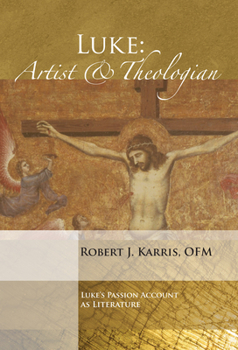Luke: Artist and Theologian
The Bible is literature as well as a sacred text. For this reason, the application of contemporary methods of literary criticism to the study of Scripture can yield rich benefits. Robert Karris' examination of Luke's Passion account exemplifies this approach. Karris argues that Luke reveals his theology through his artistry, particularly in the themes he chooses to develop and the means by which he does so. These themes provide Karris with an important insight into two questions: Why, in Luke's understanding, was Jesus crucified, and what was the significance of that death? Faithfulness is one more important theme Karris discovers in Luke's Gospel. Luke's Jesus portrays God as endlessly faithful, forgiving, and merciful, even to those unfaithful to him. Justice also surfaces as a clear theme in Luke. Jesus associated with outcasts and preached justice toward victims of his day. When the religious leaders of that time apposed this life-style of justice, Jesus assumed the role of the suffering righteous one. The author concludes by examining Luke's interest in the eating habits of Jesus. By no accident was Jesus slandered as a drunkard and glutton. Hies practice of eating with the unrighteous asserted that the seats at God's banquet table were reserved for the outcasts and the sinners. Karris's study shows that Luke saw the reason for Jesus's death to be rooted in the reason for his life. His conclusions will have value for both the student of Scripture and the individual or group interested in the issues of justice and society.
Format:Paperback
Language:English
ISBN:1606084534
ISBN13:9781606084533
Release Date:March 2009
Publisher:Wipf & Stock Publishers
Length:138 Pages
Weight:0.40 lbs.
Dimensions:0.3" x 5.4" x 7.7"
Customer Reviews
1 rating
A Glorious Physician & Artist narrates "How 'Jesus got himself killed"
Published by Thriftbooks.com User , 16 years ago
"Twenty years after reading Karris' insightful Luke, Artist and Theologian, I still share memorable quotes from that volume with my students, such as 'Jesus got himself killed because of the way he ate.' Expanding the chapter on the theme of food from that previous work, Karris provides further fare,... in Jesus' day and challenges readers about contemporary practices. Karris once again serves up a rich banquet for students of the Third Gospel." Barbara Reid, O.P., Professor of NT, Catholic Theological Union, Chicago. Prologue to Luke's: I was so happy to respond to a hermeneutical challenge of my esteemed friend Thiognostus, to review Luke, by choosing my own preference of Fr. Karris' numerous writings on Luke. All Alexandrines are drawn to Luke's narrative investigated accurately anew of the events "that were fulfilled among us." and acts, written for the most excellent Theophilus of Alexandria. Their great defender of Christ's Hypostatic union, and its subsequent soteriology wrote the best commentary on Luke, todate. fables about the Physician and Artist are traditional stories I heard as a young teenager, but this Chicago learned theologian analysed it in a compelling style that I would leave for the reader to compare with Schweizer's Luke, a challenge to present theology Themes of Luke's Gospel: Luke's Gospel is written out of faith in the risen Lord with a primary intent to bring the faithful into saving encounter with the Lord who, raised from the dead, lives among us in the glory of the Holy Spirit. Faithful reading and hopeful hearing of the Gospel empowers the individuals to access the hospitality of the Loving father encountered in Jesus. Luke portrays the life and ministry of Jesus as a divine "visitation" into our material world, seeking and offering hospitality. The One who comes as guest becomes host and offers Abrahamic hospitality in which the entire world can join, and experience salvation within the depths of their hearts. The Hospitality of God lingers upon scenes where the theme is particularly prominent, such as the themes of food, justice, unfolding into his thematic Christology and Soteriology. Those who readily offer hospitality in Luke's Gospel are mainly the outcast and the poor, realizing a much generous milieu of divine hospitality. Luke's Gospel, ever interested in the process of human transformation, so nobody may be left out of the banquet of the kingdom to which God calls all human beings to God's ways of salvation. Evangelist and Physician: The figure of St. Luke looms large out of both the New Testament and the pages of documented human history so that nearly two thousand years after his death his awesome image is undiminished. His fellow apostle St. Paul called him the 'glorious physician,' but that was only one of the talents which this magnificent man applied in a service to God. Hailing from the ancient city of Antioch, Syria, Luke was a well-educated Greek-speaking Roman citizen whose early conversio





